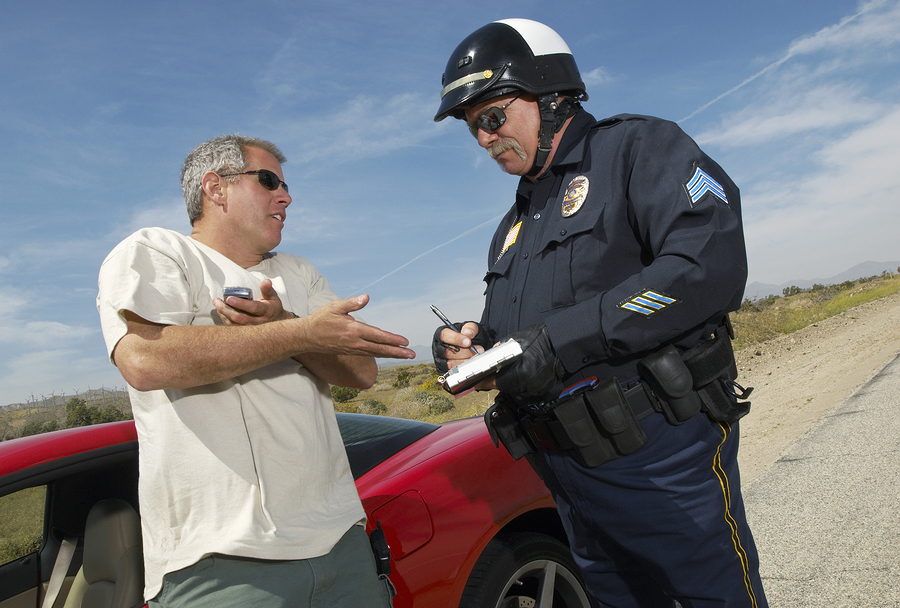When you are confronted by police, there are many things you should and should not do in order to protect yourself. Not only can the right knowledge regarding police dealings help you avoid self-incrimination, it can ensure your freedoms are not taken away on the spot. For a start, continue reading to review some frequently asked questions and answers about police interactions.

If a Cop Stops Me on the Street, Do I Have to Talk to Them?
If you are walking down the street or sitting on a bench, and an on-duty police officer stops to speak to you or ask you a question, you must comply. Even if you feel like their actions are illegal or they are harassing you, you are still required to stop and cooperate with their orders, no matter the circumstance. Furthermore, anything you say or do during this stop can be used against you later on.
If a cop stops you, but does not tell you why, you can ask, “Am I being detained?” Be sure to use this exact language. If the cop says no, you can ask if you can now walk away. Do not just walk away, as this can create confrontation. If the cop says yes, then you are immediately entitled to a lawyer by law, and can refuse to answer any more questions without your lawyer present. If you do this, be prepared to be arrested.
Can a Cop Search My Car Without My Permission?
The Fourth Amendment of the United States Constitution gives citizens the right to be free of unlawful or unreasonable searches and seizures by law enforcement officials. It means that police and other forms of law enforcement must have a good reason to legally search a person or their property, as well as, seize personal belongings or make an arrest. “Good reason” is established when police identify tangible evidence or facts that leads them to believe a person is committing, has committed, or intends to commit a crime. This is also referred to as probable cause.
If sufficient probable cause is present during a police encounter in a place where privacy is not expected, a search and seizure is not deemed unreasonable, therefore, it is not illegal. However, police have the authority to make this determination. So, the answer to this question is, yes, a cop can search your car if they want to. There is very little chance that they are found guilty of an illegal search later on.
Is it Against the Law to Insult a Cop?
Whether or not it is illegal to insult a cop depends on the circumstance. In all cases, if you insult a cop, you are taking on the risk of being stopped, questioned, searched, and if found partaking in criminal activity or wanted by warrant, arrested on the spot. Under law, it is illegal to interfere with a police investigation, and to use “fighting words” towards an officer. If your insults fit into one of these two categories, then you can be arrested.
Can a Cop Arrest a Child?
Juveniles between the ages of 11 and 17 years old can be arrested by a police officer if they are caught breaking the law. If a child under the age of 10 years old commits a crime, they are not tried in the juvenile court system. Instead, they are entered into a state-run or government-administrated social services program. Here, they are evaluated and rehabilitated by professionals in the social service and childcare industries.
If a Cop Doesn’t Read Me My Rights, Will My Charged Be Dropped?
The rules and regulations regarding Miranda warnings and what police officers must say to people under arrest differ among jurisdictions within the United States. It is important to understand that Miranda warnings are not meant for every police interaction, and may not always be read to a person. The only situation in which law enforcement is required to read a person their Miranda rights is if custodial interrogation is going to take place. This means if police officers intend to interrogate and question a suspect for the purpose of making an arrest, they must read the suspect their Miranda warnings first before questioning them.
Can a Park Ranger Arrest Someone?
Park rangers can (and will) arrest a person who breaks the law, whether it’s a state law, federal law, or park rule. Misunderstanding the role of a park ranger has cost many people a night in jail. If you are a frequent camper, hiker, fisher, or park visitor, be sure to fully understand that park rangers are the boss. In fact, park rangers are not the only authorities you might come across. Individuals like park police, game wardens, and other park officials are also in charge of enforcing rules.
Can a Security Guard Arrest Someone?
A security guard has a lot of authority in terms of guarding and protecting, but their authority to arrest a person is limited. Although they cannot actually arrest a person like police can, they do have the right to make a citizen’s arrest, just as we all do. However, a citizen’s arrest can only take place under these specific circumstances: 1) the offender committed a felony, or 2) the offender attempted to commit, or did commit, a misdemeanor in their presence. In the case of a felony, the offense must have actually been committed for a security guard to make a citizen’s arrest. In the case of a misdemeanor or infraction, the crime must have been made or attempted in the presence of the security guard.
Where to Get Trusted Criminal Defense in Indiana
Call the Law Office of David E. Lewis at 317-636-7514 to schedule a free initial consultation with aggressive Indiana criminal defense lawyer who will stop at nothing to protect your rights and preserve your freedoms. With decades of hands-on experience, you can trust Attorney David E. Lewis to build you a strong and impactful defense against your Indiana criminal charges.

